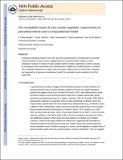The mentalistic basis of core social cognition: experiments in preverbal infants and a computational model
Author(s)
Kiley Hamlin, J.; Goodman, Noah; Ullman, Tomer David; Tenenbaum, Joshua B; Baker, Christopher Lawrence
Downloadnihms594508.pdf (1.211Mb)
OPEN_ACCESS_POLICY
Open Access Policy
Creative Commons Attribution-Noncommercial-Share Alike
Terms of use
Metadata
Show full item recordAbstract
Evaluating individuals based on their pro- and anti-social behaviors is fundamental to successful human interaction. Recent research suggests that even preverbal infants engage in social evaluation; however, it remains an open question whether infants' judgments are driven uniquely by an analysis of the mental states that motivate others' helpful and unhelpful actions, or whether non-mentalistic inferences are at play. Here we present evidence from 10-month-olds, motivated and supported by a Bayesian computational model, for mentalistic social evaluation in the first year of life. A video abstract of this article can be viewed at http://youtu.be/rD_Ry5oqCYE
Date issued
2013-02Department
Massachusetts Institute of Technology. Department of Brain and Cognitive SciencesJournal
Developmental Science
Publisher
Wiley-Blackwell
Citation
Kiley Hamlin, J. et al.“The Mentalistic Basis of Core Social Cognition: Experiments in Preverbal Infants and a Computational Model.” Developmental Science 16, 2 (February 2013): 209–226 © 2012 Blackwell Publishing Ltd
Version: Author's final manuscript
ISSN
1363-755X
1467-7687